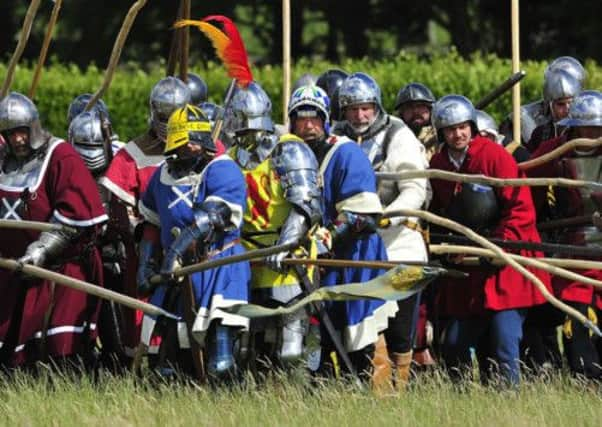Comment: Independence will change future, not past


The independence referendum creates a strange dichotomy between the illusion of narrow nationalism and the very real existence of national pride.
Opponents of independence have attempted to construct a hinterland for the Yes campaign which obsesses over history and which dwells on past glories at the expense of the current realities and difficulties we face in modern Scotland. All this is apparently fuelled by a diet of whisky and porridge, clothed in tartan and draped with a Saltire. The most virulent critics of the independence campaign have been happy to lean back against their union flag cushions, shout “Braveheart” and, with no apparent sense of irony, shake their heads at the separatists.
Advertisement
Hide AdAdvertisement
Hide AdTo many of those in the pro-independence movement this caricature is almost laughable and bears little resemblance to the campaign of civic nationalism which the SNP has endorsed for the last few years. That campaign shies away from national identity in favour of a sovereign state accountable to those who live in Scotland and contribute to our diversely rich culture. The oft-quoted late SNP MSP Bashir Ahmad exemplified the idea that the modern independence movement is more interested in the future than the past when he said, “it isn’t important where you come from, what matters is where we are going together as a nation”.
The Yes Scotland campaign has been remarkably free of Salmond-like Saltire-hoisting and nationalistic rhetoric, something which has surprised a few. As a coalition of nationalists and non-nationalists, Yes encompasses those for whom independence is more a means to drive the kind of change unavailable under the current constitutional framework, as well as those for whom independence is the goal in itself. This gentle approach has its critics who argue that the resulting debate is stale and predicated on the head and not the heart.
For all the accusations fired at the Yes campaign, the real jingoism has come bellowing from the No campaign, which has embraced the union flag as symbolic of the conjoined nature of Scotland and the rest of the UK (rUK) with all the fervour of a convert. There is no institute of state or heartstring which is off-limits to the No campaign as it attempts to ramp up emotional Britishness, nor is there any limit to the lengths it will go.
Whilst the official Yes campaign eschews displays of overt national identity to appeal to the head, the No campaign proceeds with a two-pronged approach to convince voters to vote No. The weak “best of both worlds” argument is shored up by the deliberate attempt to erode confidence in Scotland’s ability to conduct its own affairs. No challenges the public to choose a national identity, yet not look below the surface to determine what Britishness means in modern Scotland, or to examine what remaining in an unequal union means for them.
Far from the Yes campaign immersing itself in history, the No campaign unashamedly uses the Second World War as an example of how well the UK has worked to fight brutality and imperialism, ignoring completely the international nature of the fight against Hitler.
There can be no argument that the unprecedented celebration of the beginning of the First World War, planned in Glasgow, and the celebration of Armed Forces Day which will be held in Stirling, both months before the referendum, are part of that crusade to ramp up British national identity. In fact, Philip Hammond, the UK defence secretary, has declared it to be so. That the First World War should give us little to be proud of, and much to regret is neither here nor there. Undoubtedly, we have a shared history of events and can take pride in many actions of our armed forces, there are, however, other actions which bring us shame, which we should not ignore. Independence will not change our shared past, it will change how we build our future.
Yet, for all the avowed Britishness and the desire of the No campaign for Westminster to retain overall control of Scottish affairs, it is incredible that Better Together head honcho Blair McDougall argues that the Prime Minister of the UK should not put the case for the state he governs up against the First Minister’s arguments for a sovereign Scottish state in a debate. Whilst Alistair Darling runs scared of his Yes counterpart, Dennis Canavan, Better Together continues to push Salmond to debate against Darling, knowing that this is as likely as Elvis taking on the First Minister. Unfortunately for Darling and the Labour Party, the coalition government is the only show in town. That is an uncomfortable truth, and Cameron is an uncomfortable figurehead. Perhaps that is what has driven McDougall to complain that Salmond “refuses to debate against a fellow Scot”.
It is extraordinary that the No campaign opens itself to such censure. It cannot be both the case that it supports the right for an overall UK mandate to select the UK government and prime minister without a significant mandate from its constituent parts like Scotland, yet want to stop the Scottish government, with its overall mandate, from having a say in the future of the UK. Cameron has no vote in Scotland, but commands only one Commons vote, with one Tory MP at Westminster. The No campaign accepts that as sufficient to govern our assets.
Advertisement
Hide AdAdvertisement
Hide AdRecent insights in to Yes Scotland research illuminated the link between self-belief in Scotland’s wealth and a trend toward voting Yes. Whilst convincing people of the inherent prosperity of Scotland; the next stage must be to marry this self-belief with a pride in Scotland as a country.
The Yes campaign has to convince voters that there is something tangible to be proud of; to have confidence in our own abilities before we can turn that pride to optimism. Yes Scotland is campaigning for the head at the moment. The argument for the heart will inevitably follow later.